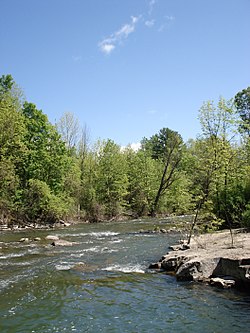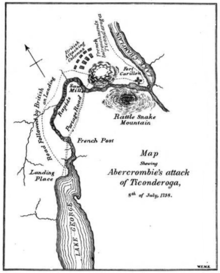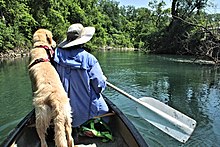| Revision as of 01:40, 22 August 2021 edit420Traveler (talk | contribs)Autopatrolled, Extended confirmed users37,254 editsNo edit summaryTags: Mobile edit Mobile web edit Advanced mobile edit← Previous edit | Latest revision as of 12:10, 19 June 2022 edit undoI dream of horses (talk | contribs)Autopatrolled, Extended confirmed users, Page movers, New page reviewers, Pending changes reviewers, Rollbackers572,256 editsm Disambiguating links with AutoWikiBrowserTag: AWB | ||
| (One intermediate revision by one other user not shown) | |||
| Line 2: | Line 2: | ||
| {{Infobox river | {{Infobox river | ||
| | name = La Chute River | | name = La Chute River | ||
| | |
| native_name = | ||
| | |
| native_name_lang = | ||
| | name_other = | | name_other = | ||
| | name_etymology = | | name_etymology = | ||
| Line 40: | Line 40: | ||
| | discharge1_max = | | discharge1_max = | ||
| <!---------------------- BASIN FEATURES --> | <!---------------------- BASIN FEATURES --> | ||
| | source1 = ] | | source1 = ] | ||
| | source1_location = | | source1_location = | ||
| | source1_coordinates= {{coord|43.8369444|-73.4311111|format=dms|display=inline}}<ref name="gnis">{{cite gnis|id=967511|name=La Chute|accessdate=August 21, 2021}}</ref> | | source1_coordinates= {{coord|43.8369444|-73.4311111|format=dms|display=inline}}<ref name="gnis">{{cite gnis|id=967511|name=La Chute|accessdate=August 21, 2021}}</ref> | ||
| Line 58: | Line 58: | ||
| }} | }} | ||
| The '''La Chute River''', also known as '''Ticonderoga Creek''', is a short, fast-moving ], near the ]–] border. It is now almost wholly contained within the municipality of ], connecting the northern end and outlet of the {{convert|32|mi|km|adj=on}} long ] and the southern end of the {{convert|172|km|mi|adj=on|order=flip}} long ]<ref>https://www.britannica.com/place/Lake-Champlain</ref> through many falls and rapids. The river drops about 230 feet (70 m) in its three and a half-mile (6 km) course, which is a larger drop than ] (167 ft (52 m)). | The '''La Chute River''', also known as '''Ticonderoga Creek''', is a short, fast-moving ], near the ]–] border. It is now almost wholly contained within the municipality of ], connecting the northern end and outlet of the {{convert|32|mi|km|adj=on}} long ] and the southern end of the {{convert|172|km|mi|adj=on|order=flip}} long ]<ref>{{Cite web|url=https://www.britannica.com/place/Lake-Champlain|title = Lake Champlain | lake, Canada-United States | Britannica}}</ref> through many falls and rapids. The river drops about 230 feet (70 m) in its three and a half-mile (6 km) course, which is a larger drop than ] (167 ft (52 m)). | ||
| Part of the ] and the ] ], ultimately its waters flow out of Lake Champlain through the {{convert|106|mi|km}} length of the ] into the ] and then into the North ] north of ]. | Part of the ] and the ] ], ultimately its waters flow out of Lake Champlain through the {{convert|106|mi|km}} length of the ] into the ] and then into the North ] north of ]. | ||
| Line 65: | Line 65: | ||
| The Champlain Valley is among the northernmost valleys considered part of the ], reaching from the province of ], Canada somewhat northeast of ] at the outlet of the ] to ]. The Champlain Valley is a ] of the larger ] which in turn is part of the larger ] physiographic division.<ref name="USGS-Water">{{cite web |title=Physiographic divisions of the conterminous U. S. |publisher=U.S. Geological Survey |url=http://water.usgs.gov/GIS/metadata/usgswrd/XML/physio.xml |accessdate=2007-12-06 }}</ref> | The Champlain Valley is among the northernmost valleys considered part of the ], reaching from the province of ], Canada somewhat northeast of ] at the outlet of the ] to ]. The Champlain Valley is a ] of the larger ] which in turn is part of the larger ] physiographic division.<ref name="USGS-Water">{{cite web |title=Physiographic divisions of the conterminous U. S. |publisher=U.S. Geological Survey |url=http://water.usgs.gov/GIS/metadata/usgswrd/XML/physio.xml |accessdate=2007-12-06 }}</ref> | ||
| Lake Champlain is situated in the ] between the ] of ] and the ] of ], and ] is located in the ] and mountain range north of the lower ] arrayed to the south and east, which give land routes through the region accessibility into the ] and ] drainage basins. | Lake Champlain is situated in the ] between the ] of ] and the ] of ], and ] is located in the ] and mountain range north of the lower ] arrayed to the south and east, which give land routes through the region accessibility into the ] and ] drainage basins. | ||
| ==See also== | ==See also== | ||
Latest revision as of 12:10, 19 June 2022
Not to be confused with the Chute River, Maine. River in New York, United States| La Chute River | |
|---|---|
 The river near Ticonderoga, New York The river near Ticonderoga, New York | |
 Fall River Route
between Lakes George and Champlain. (1758) Fall River Route
between Lakes George and Champlain. (1758) | |
  | |
| Location | |
| Country | United States |
| State | New York |
| Region | Adirondacks |
| County | Essex |
| City | Ticonderoga |
| Physical characteristics | |
| Source | Lake George |
| • coordinates | 43°50′13″N 73°25′52″W / 43.8369444°N 73.4311111°W / 43.8369444; -73.4311111 |
| • elevation | 318 feet (97 m) |
| Mouth | Lake Champlain |
| • coordinates | 43°50′10″N 73°23′38″W / 43.8361712°N 73.3940076°W / 43.8361712; -73.3940076 |
| • elevation | 92 feet (28 m) |
| Length | 3.7 mi (6 km) |
The La Chute River, also known as Ticonderoga Creek, is a short, fast-moving river, near the Vermont–New York border. It is now almost wholly contained within the municipality of Ticonderoga, New York, connecting the northern end and outlet of the 32-mile (51 km) long Lake George and the southern end of the 107-mile (172 km) long Lake Champlain through many falls and rapids. The river drops about 230 feet (70 m) in its three and a half-mile (6 km) course, which is a larger drop than Niagara Falls (167 ft (52 m)).
Part of the Lake Champlain Valley and the St. Lawrence River drainage basin, ultimately its waters flow out of Lake Champlain through the 106 miles (171 km) length of the Richelieu River into the St. Lawrence River and then into the North Atlantic Ocean north of Nova Scotia.
Geology and physiography
The Champlain Valley is among the northernmost valleys considered part of the Great Appalachian Valley, reaching from the province of Quebec, Canada somewhat northeast of Montreal at the outlet of the Richelieu River to Alabama. The Champlain Valley is a physiographic section of the larger Saint Lawrence Valley which in turn is part of the larger Appalachian physiographic division.
Lake Champlain is situated in the Champlain Valley between the Green Mountains of Vermont and the Adirondack Mountains of New York, and Lake George is located in the Adirondack Park and mountain range north of the lower Berkshire Hills arrayed to the south and east, which give land routes through the region accessibility into the Hudson River and Connecticut River drainage basins.
See also

Footnotes
- ^ "La Chute". Geographic Names Information System. United States Geological Survey, United States Department of the Interior. Retrieved August 21, 2021.
- "Lake George". Geographic Names Information System. United States Geological Survey, United States Department of the Interior. Retrieved August 21, 2021.
- "Lake Champlain | lake, Canada-United States | Britannica".
- "Physiographic divisions of the conterminous U. S." U.S. Geological Survey. Retrieved 2007-12-06.